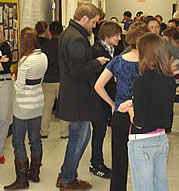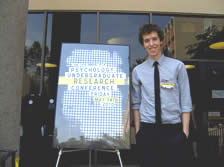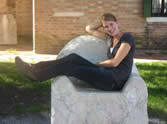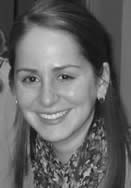Emil's Epilogue -
March 2011
Gustie Psych
News & Events
Psychology Majors - Mark your calendars for the following important dates:
- NCUR, (National Conference on Undergraduate Research) March 31 - April 2, 2011 - Ithaca College - Ithaca, New York
- MUPC (Minnesota Undergraduate Psychology Conference), April 16, 2011, Carleton College
- The deadline for registering for MUPC 2011 is March 25, 2011
- MidBrains 2011 - April 30 - St. Olaf
- Gustavus Celebration of Creative Inquiry, May 6
- Gustavus Honors Day Saturday, May 7
- Gustavus Psychology Research Symposium, Friday, May 13
- The department's traditional spring picnic for majors will immediately follow the symposium - more information to follow.
Gustavus Psychology Research Symposium - Friday May 13

Reflections on Research...
by Jean Paul Noel
At the end of every semester the hallways of the basement of SSC fill up with people for the occasion of the Psychology Research Symposium. Posters are up, Research Methods II students gracefully explain their results and frustrations, and General Psych students walk around asking questions in search for extra-credit. This is a common picture that the walls currently inhabited by the Psychology Department will soon stop seeing.
The reason behind this loss is obviously the move to the new academic building, not to a halt in the pursuit of academic research within the department - research being one of the main pillars assisting in the further examination of the field.
 There is something invaluable about independent exploration. Not everything can be learned from a textbook, or within the confined four walls of a classroom. Psychology is a field that is very much alive, and actively participating in the research community, with the hope of perhaps adding to a body of knowledge, aids in that realization. Reading about perception, or attention, or memory, or stereotypes, becomes much more real and meaningful, and much less intimidating, with some experience in the field of psychological research.
There is something invaluable about independent exploration. Not everything can be learned from a textbook, or within the confined four walls of a classroom. Psychology is a field that is very much alive, and actively participating in the research community, with the hope of perhaps adding to a body of knowledge, aids in that realization. Reading about perception, or attention, or memory, or stereotypes, becomes much more real and meaningful, and much less intimidating, with some experience in the field of psychological research.
The challenge that it supposes to connect different bodies of research, different points of view and different approaches to psychological research, while designing an elegant and efficient way to test one’s predictions, is a beautiful one. In a sense the job of a researcher in Psychology is comparable to the task taken in hand by a private detective. With the added satisfaction that researchers are not in search for the evildoer, but for knowledge and understanding.
[Jean Paul is a junior pyschology honors major and a neuroscience minor. He is a departmental assistant, assists with research, is a member of the newsletter staff, a Spanish tutor and enjoys intramural soccer.]
John Kendall Lecture Series Presentation - Spring 2011
by Alyssa Gilgenbach
On February 28, 2011, Kathleen Vohs ‘96 presented “Small Reminders of Money Produce Big Changes in Behavior” to a full house in Wallenberg Auditorium in Nobel Hall. Dr. Vohs is the Land O’Lakes Professor of Marketing and McKnight Presidential Fellow at the Carlson School of Management, University of Minnesota. Her lecture was a fascinating address about how subtle reminders of money can affect the way that people behave. Her presentation focused on h![]() er research in which she would have money appear in a study (on a screensaver, poster, also counting dollar bills etc.) and then look at the participant’s changed behavior as a result. Her findings show that people tend to be less generous, less kind, and are more likely to want to be alone when money is present in the research. Little research has been done on the psychological effects of money so, hopefully, as Dr. Vohs continues her study, we will learn more about the relationship between money and human behavior.
er research in which she would have money appear in a study (on a screensaver, poster, also counting dollar bills etc.) and then look at the participant’s changed behavior as a result. Her findings show that people tend to be less generous, less kind, and are more likely to want to be alone when money is present in the research. Little research has been done on the psychological effects of money so, hopefully, as Dr. Vohs continues her study, we will learn more about the relationship between money and human behavior.
[Alyssa Gilgenbach originally hails from Stillwater, Minnesota. She is a senior psychology 
Alumni Update - Jennifer Grundman '10
Hello Gustie Psychologists! Since graduating in May, I have been working on a Master's Degree in Educational Psychology at the University of Minnesota--Twin Cities. My specific program is called Counseling & Student Personnel Psychology and I am in the School Counseling Track. For me, graduate school has been very similar to my days at Gustavus. I am enrolled in four classes per semester, each emphasizing tests, papers, and presentations. Because the program uses a practitioner model of counseling, I have been learning and practicing many counseling skills. For me, it has been fascinating to finally apply theory and content from my courses to the lives of real individuals with real concerns. I am currently taking my thesis class, "Research
For those who are considering graduate school or have already completed the applications and are waiting to hear back, I want you to know that Gustavus prepares its psychology students very well for the graduate level. Also, as a student at GAC I was scared of the field of "counseling"... it sounded mysterious, intimidating, and too hands-on for me. But, I LOVE it! If you are at all interested in helping individuals who are struggling with mental health issues, counseling is an excellent route. And, an excellent way to put what you learn at GAC into action. Study hard, take advantage of the honors/senior thesis option (I am using my honors thesis as a base for my master's thesis), and thank your professors. They may be sticklers about APA format and they may push you to use only peer-reviewed articles, but you will be thankful!!
Also, if you have questions about the CSPP program at the U of MN, feel free to contact me (jkgrundman@gmail.com)... it's a fabulous program.
Click here for Previous Alumni Updates
Faculty Research and Faculty/Student Research and Publications
Kyle Chambers
Chambers, K. E., Onishi, K. H., & Fisher, C. (in press). Representations for phonotactic learning in infancy. Language Learning and Development.
Abstract - Infants rapidly learn novel phonotactic constraints from brief listening experience. Four experiments explored the nature of the representations underlying this learning. 16.5- and 10.5-month-old infants heard training syllables in which particular consonants were restricted to particular syllable positions (first-order constraints) or to syllable positions depending on the identity of the adjacent vowel (second-order constraints). Later, in a headturn listening-preference task, infants were presented with new syllables that either followed the experimental constraints or violated them. Infants at both ages learned first- and second-order constraints on consonant position (Experiments 1 and 2) but found second-order constraints more difficult to learn (Experiment 2). Infants also spontaneously generalized first-order constraints to syllables containing a new, transfer vowel; they did so whether the transfer vowel was similar to the familiarization vowels (Experiment 3), or dissimilar from them (Experiment 4). These findings suggest that infants recruit representations of individuated segments during phonological learning. Furthermore, like adults, they represent phonological sequences in a flexible manner that allows them to detect patterns at multiple levels of phonological analysis.
Marie Walker Self and Identity class (PSY 344)
Poster accepted for presentation at the 2011 APS Annual Convention, May 26 - 29, 2011 in Washington, DC - Identity Development and Political Self-Regulation in Emerging Adult Voting Attitudes and Behaviors - Marie Walker, Aaron Bakke, Jonas Broccard, Kevin Dumke, Kirsten Engel, Jennifer Ewert, Alex Gjorvad, Brianna Heinrich, Paul Huff, Nick Ross, David Samb, Lori Kay Thomas, Tiffany VandenBussche, Emily Wendorf, Tanner Winslow and Pang Xiong, Gustavus Adolphus College
Data from emerging adults during the 2010 state/federal election indicated that identity commitment and perceiving oneself as an adult were related to political attitude strength and information seeking. Internalized political self-regulation was related to political information seeking and behavior. These results have implications for enhancing young adult political engagement.
Jennifer Ackil
Dr. Ackil recently had a paper accepted for publication in the journal of Applied Cognitive Psychology.
Forced Fabrication vs. Interviewer Suggestions: Differences in False Memory Depend on how Memory is Assessed
Many studies show that witnesses can develop false memories for suggested misinformation provided by an interviewer. The forced fabrication effect extends this finding by demonstrating that witnesses can also develop false memories for events they were forced to fabricate themselves. In two experiments we compared the incidence of false memory following forced fabrication and interviewer provided suggestion under various conditions (pre-test warning/no warning; one-week/two-week delay) and type of test (source recognition vs. narrative recall). Whereas interviewer suggestions resulted in more false memories than forced fabrications on source recognition tests when participants overtly resisted fabricating and were warned at test, tests of narrative recall showed the opposite pattern even with pre-test warnings: fabrications generated following overt resistance led to more false recall than interviewer provided suggestions. This dissociation between suggestive interview type and test type indicates that predictions about the deleterious consequences of interviews are dependent on the way memory is assessed.
Upcoming Events for Psychology Majors sponsored by Psi Chi
Psychology Major
Info Night - for all students interested in learning more about the
 psychology major at Gustavus - come and ask questions and learn more about
all of the aspects of the department - Monday, March 21 at 7:00 p.m. in the Courtyard Cafe.
psychology major at Gustavus - come and ask questions and learn more about
all of the aspects of the department - Monday, March 21 at 7:00 p.m. in the Courtyard Cafe.
Psychology Professionals Panel
- Gustie psychology alumni representing a variety of careers will be available to discuss the many possible fields students can
enter with a psychology major after college - tenatively scheduled for Tuesday, April 26th at 7:00.
Relay for Life is the 30th of April and begins at 7 p.m.! ALL interested psychology majors are encouraged to sign up on the Relay website under the team "Psi Chi"! Thank you!
Questions? Contact Kierst Finsand at kfinsand@gustavus.edu
Research and Career Opportunities
Paid Summer Research Experiences at Vanderbilt's Peabody College - Summer Research Early Identification Program (SR-IEP). Students who want to work with a Peabody faculty member on a summer research project should apply at www.theleadershipalliance.org
Yale Mind and Development Lab Summer Internship Program - The Yale Mind and Development Lab, under the direction of Dr. Paul Bloom, is accepting applications for its annual Summer Internship Program. The Infant Cognition Center at Yale University, directed by Dr. Karen Wynn, is accepting applications for our annual summer internship program, which runs from June 1 to August 15 (flexible). Johns Hopkins Laboratory for Child Development Summer Internship Program University of Delaware Infant Language Project Professors Jessica Cantlon and Brad Mahon are seeking a full-time lab manager/research assistant for their Concepts, Actions, and Objects Lab at the University of Rochester. The position will offer the opportunity to engage in a wide array of research methods converging on the topic of conceptual thought.
The Temple Infant Lab, directed by Professors Kathy Hirsh-Pasek and Nora Newcombe, conducts research on language acquisition, parent-child play interactions, spatial development, memory development, and spatial learning both in theory and application.
INFANT RESEARCH LAB COORDINATOR: FLORIDA INTERNATIONAL UNIVERSITY YALE UNIVERSITY COGNITION AND DEVELOPMENT LAB
FULL-TIME RESEARCH ASSISTANT POSITION AVAILABLE